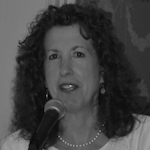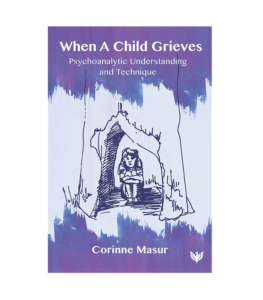
Dr Corinne Masur is a licensed clinical psychologist, a child and adult psychoanalyst, an associate supervising child analyst, and an adult supervising psychoanalyst at the Psychoanalytic Center of Philadelphia (PCOP). She has been in private practice, seeing mothers and infants, children of all ages, and adults for over thirty-five years. She is the co-director of The Parent Child Center and a founder of the Philadelphia Center for Psychoanalytic Education (PCPE) and The Philadelphia Declaration of Play.
Here she talks about the relevance and intentions of her new book When A Child Grieves: Psychoanalytic Understanding and Technique
In the time of Covid an unprecedented number of children are losing loved ones. Many have lost one or more grandparents and, worse, one or both parents. And we know that when a child loses a parent, the course of her life is irrevocably altered and she is forever changed. She is suddenly and violently transported to a place made up of unknowns: Where will I find love now that the person who loved me is no longer alive? How do I love someone who is no longer here to love? Who am I now that my parent is no longer alive?
Almost five decades ago, Erna Furman wrote an excellent compendium of psychodynamic theory and practice related to childhood bereavement, A Child’s Parent Dies. And it was my intention in writing When A Child Grieves to provide an updated resource following in this tradition. Little did I know that the book would become even more relevant than I imagined, coming out as it is during a worldwide pandemic.
As we are all aware, the relationship between child and parent is the most critical of all formative relationships and the wellspring for all subsequent attachments. The loss of a parent is devastating to the child, or adolescent, to her emerging sense of self, to her personality development, to her feelings about life, and to her future interpersonal relationships and psychological health. The death of a parent interrupts childhood and cannot help but transform the child. Who she might have been is forever altered by loss and its impact. As Erna Furman noted, only in childhood can death deprive an individual of so much opportunity to love and be loved and face her with so difficult a task of adaptation.
I, myself, suffered the loss of a parent in adolescence. I vividly remember when and how I heard that my father had died. This is the moment that my world changed forever. My life became divided into ‘before’ and ‘after’. The loss of my father irrevocably changed my inner world and my autobiographical narrative.
I wrote this book for myself, to help me to better understand how I was altered by my loss and I also wrote it for other clinicians who will treat the many bereaved children who come into their clinics and offices.
In When A Child Grieves, I describe how unique each child’s way of responding to parental death can be and how different it is from a similar loss experienced by an adult. The child or teen is still in the process of development and, as such, has a developmental need for the parent. I outline the effects and the impact of loss at each age and stage of development and describe the possible defences against the affective experiencing of grief and loss, as well as the barriers to mourning that difficult external circumstances may create. Moreover, I update the understanding of loss, providing recent theoretical contributions from the relational and interpersonal schools which conceptualize bereavement as being both an internal and an external process and one that requires both inner resources and relational support.
I truly hope that this book will help clinicians to understand the experience of children who suffer grief and loss, and that it will help them to learn how to sensitively evaluate and treat these children.
Corinne Masur
